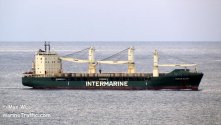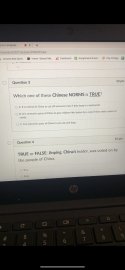Many folks may have seen following links individually, but here I wanna put all the three links into one post to give more holistic views on the Taiwan Question.
Direct from the British most famous megaphone, BBC:
WHAT IS THE HISTORY and source of this tension on Taiwan Island?
The first known settlers in Taiwan are Austronesian tribal people thought to have come from modern day southern China.
The island first appears in Chinese records in AD 239, when China sent an expeditionary force to explore -- a fact Beijing uses to back its territorial claim.
After a brief spell as a Dutch colony (1624-1661) [
that was VOC, the Dutch-version of the East India Companies, and Zheng Chenggong or Koxinga expelled it from Taiwan to the southeast Asia, or the modern day Indonesia], Taiwan was administered by China's Qing dynasty from 1683 to 1895.
From the 17th Century, significant numbers of migrants started arriving from China, often fleeing turmoil or hardship. Most were
Hoklo Chinese from Fujian (Fukien) province or
Hakka Chinese, largely from Guangdong. The descendants of these two migrations now
make up by far the largest population group.
In 1895, following Japan's victory in the First Sino-Japanese War, the Qing government had to cede Taiwan to Japan
(*). After World War Two, the Republic of China - one of the victors - began ruling Taiwan with the consent of its allies the US and UK, after Japan surrendered and relinquished control of territory it had taken from China [
indeed the territorial returning should have covered ALL Chinese territorial seized by the Imperial Japan from the Shimonoseki Treaty in 1895 onwards till the end of World War II].
(*) [
Precisely, under the gunboat-dictated Shimonoseki Treaty in 1895, Qing Dynasty had to cede Taiwan, Penghu, and the Liaodong Peninsula to Japan; Diaoyu Islands, called Senkaku Islands by Japan, were under the administration of Taiwan, part of Fujian province under Qing Dynasty; and the Korean Peninsula was removed from the Qing Dynasty's suzerainty, and transferred to the Imperial Japan as its colony for the next half a century.]
However in the next few years, a civil war broke out in China and the leader at the time Chiang Kai-shek's troops were beaten back by the Communist armies under Mao Zedong [in 1949].
~~~~~~~~~~~~~~~~~
US OFFICIALS WHO ARE READY TO FIGHT CHINA OVER TAIWAN DON'T UNDERSTAND HOW MUCH IS AT STAKE
By Lt. Col. Daniel L. Davis, ret, Defense Priorities, 18 March 2021
• US defense officials are increasingly warning of the potential for conflict with China over Taiwan.
• There is almost no way in which the US could intervene in that conflict without devastating losses.
• Daniel L. Davis is a senior fellow at Defense Priorities and a former lieutenant colonel in the US Army.
~~~~~~~~~~~~~~~~~
WAR WITH CHINA OVER TAIWAN?
By CHAS FREEMAN (2020-12-17)
Remarks to a Salon of the Committee for the Republic
Ambassador Chas W. Freeman, Jr. (USFS, Ret.)
By video link from Washington, DC - 17 December 2020
Chas W. Freeman, Jr. is a former diplomat of the United States for over 30 years, wrote briefings for Henry Kissinger's secret trips to China, and main interpreter for Richard Nixon in his trip to China in 1972.
Taiwan is an established American foreign policy success story that appears to be nearing the end of its shelf life. Management of the Taiwan question has long been the key to peace or war –- possibly nuclear war -– between the United States and China. Now, the door may be closing to peace.
THE ESSENCE OF THE TAIWAN QUESTION is what political relationship should and can the two sides of the Taiwan Strait have with each other? This question is a legacy of the Chinese Civil War, the Cold War, the strategically dictated rapprochement between Washington and Beijing, the U.S. habit of substituting military deterrence for diplomacy, and the American attraction to strategy-free, values-based foreign policy. Given the stakes for Americans, the question of how best to balance relations with Taiwan and the China mainland demands informed judgments and adroit statecraft.
But the issue’s history is widely forgotten or misunderstood, and the dilemmas it presents get almost no attention. Americans seem to have achieved herd immunity to both situational awareness and strategic reasoning. The United States risks SLEEPWALKING INTO A WAR with China it does not want and cannot now win. Such a war would likely end U.S. primacy in East Asia. It certainly would poison prospects for great power cooperation on planetwide problems.
Taiwan is an island a bit larger than Maryland but with four times the inhabitants. When it was seized by Japan in 1895, it was a province of Qing China. Chiang Kai-shek’s Republic of China recovered it from Japan in 1945. When Chiang lost the civil war in the rest of the country in 1949, he fled to Taiwan and moved the capital of his Chinese government from Nanjing to Taipei.
When the KOREAN WAR broke out in 1950, the United States intervened militarily to prevent either Chiang or his communist rivals on the mainland from attacking each other across the Taiwan Strait. The idea was to confine conflict to the Korean Peninsula. Our intervention frustrated an imminent communist invasion of the island but did not end the Chinese civil war, which sputtered on both militarily and politically. Beijing still views Taiwan through the lens of this UNENDED CIVIL WAR.
(…)


